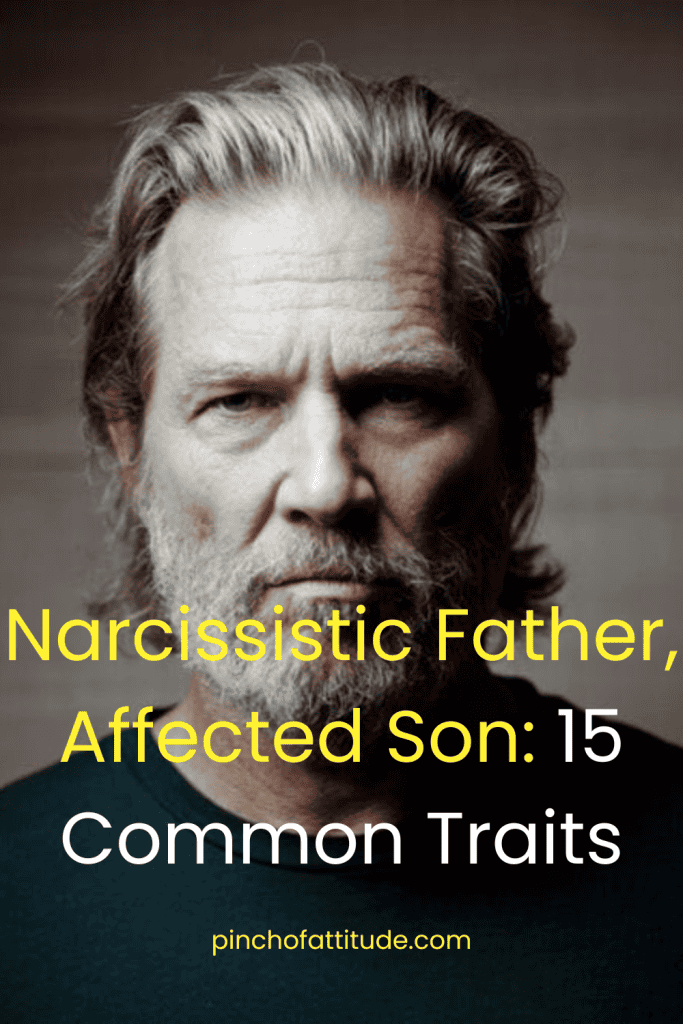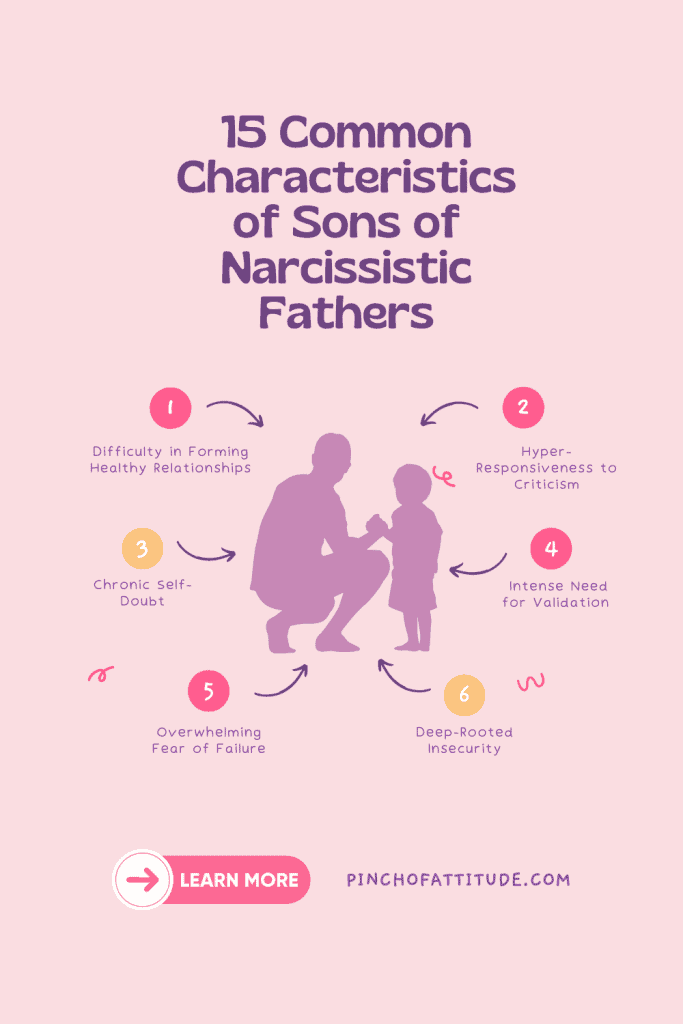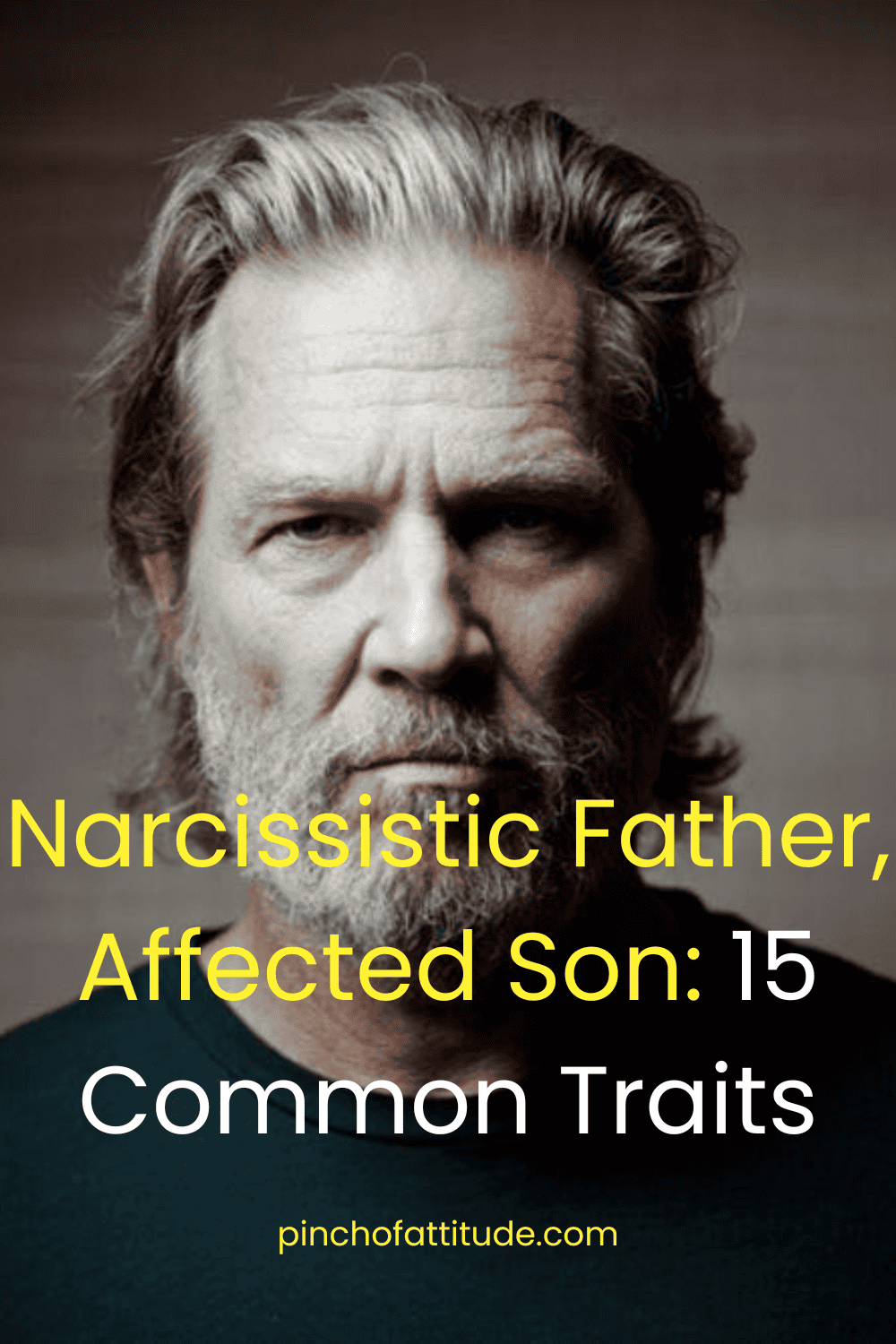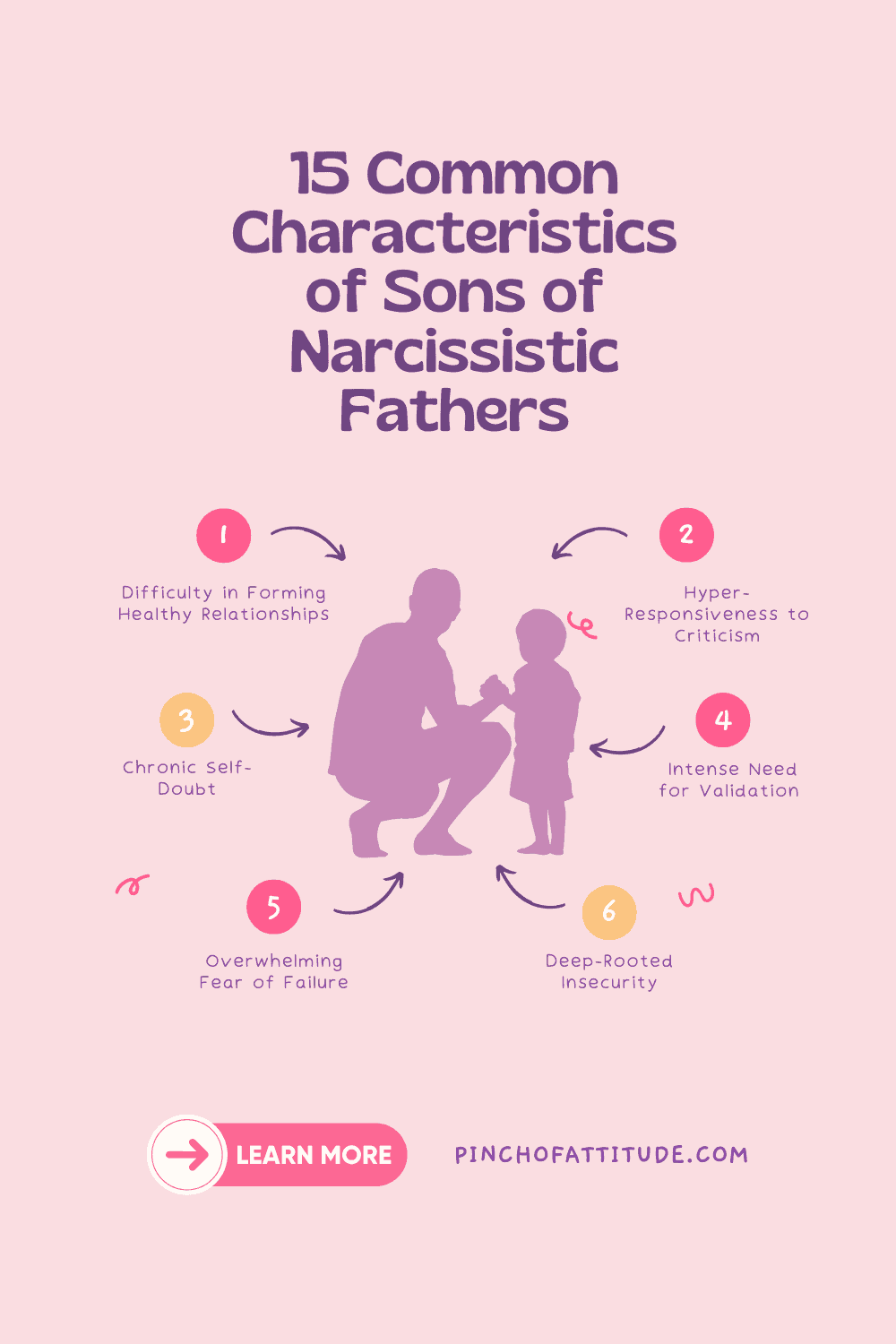If your dad shamelessly one-ups your every accomplishment to be the center of attention, I won’t be shocked if you think your father is a narcissist.
As a child of a narcissist mom, I get it. But what I’m curious about is the sons on the other side of the coin, those raised by fathers who hold the starring role in the family drama.
Abandoned by their dad in childhood, I’ve watched my cousins carry a different set of emotional baggage than what I carried.
Their experiences made me want to look into the characteristics of sons of narcissistic fathers.
So, I started digging – into research, support groups, and even family memories whispered over steaming mugs of coffee.
What I found wasn’t just a laundry list of challenges, but stories of resilience, compassion, and a shared yearning to finally break free from the past.
- The scars from your father’s narcissism are real, but they don’t have to dictate your future. Healing is possible.
- You deserve a genuine connection. Learn to listen to your intuition, set healthy boundaries, and build relationships based on mutual respect.
- You’re not measured by his standards or starved for his approval. You can be happy, confident, and thrive.
Table of Contents
15 Characteristics of Sons of Narcissistic Fathers

Sons of narcissistic fathers often share common personality traits because of the invisible scars they carry from their childhood.
If you also feel like you’re living under the ever-present shadow of a demanding parent, maybe you can relate to these characteristics:
1. Hyper-Responsiveness to Criticism
Do you constantly walk on eggshells around your dad? Like one misplaced word could trigger an emotional earthquake?
Well, for adult sons of narcissistic fathers, that caution often morphs into hyper-responsiveness to any criticism, even the mildest kind.
It’s like their internal alarm system is perpetually on high alert, scanning for even the faintest hint of disapproval.
Even constructive feedback can feel like an attack, and they would either scramble to defend themselves or just shut down completely.
It’s important to remember, though, that this isn’t your fault.
A narcissistic father often builds himself up by tearing others down. For you, this means growing up under a microscope and becoming hyper-aware of any potential negativity.
It can make you doubt your every move, second-guess your choices, and constantly strive for an impossible standard of perfection.
2. Intense Need for Validation
Imagine a school play buzzing with parents, except one set of seats remains stubbornly empty. That’s the reality for many sons of narcissistic fathers.
Their dads, often self-absorbed and image-obsessed, dole out praise like rare gemstones, leaving them desperate for any crumb of recognition.
Take my cousins, for example. As kids, they’d pour their hearts into school projects, hoping for a glimmer of pride from their absent father.
Drawings, poems, even homemade trophies – anything to earn a mention, a pat on the back, a sign they hadn’t been completely erased.
It was heartbreaking to see their eyes light up at the prospect of their narcissistic father’s approval, only to dim with each passing silence.
That intense need for validation is a sign of resilience, not weakness.
It’s a testament to your capacity for love and connection, a yearning you can now choose to fulfill through healthy relationships and self-acceptance.
3. Deep-Rooted Insecurity
Sons raised by a narcissistic father are often unsure if their next step will trigger an emotional earthquake.
Their childhoods are a blur of unpredictable moods and shifting expectations, leaving them with a deep-rooted insecurity that can linger even into adulthood.
They’d learned, through years of being belittled by their father, that anything good they did could be snatched away, turned into another opportunity for him to shine.
They’d ace a test, then brush it off as “dumb luck.” Land a coveted internship, then joke about being an “underdog who stumbled in.”
It wasn’t false modesty. It was a shield.
The good news is, you are not doomed to self-doubt. By acknowledging this vulnerability, you can start to dismantle it.
Tip
Embrace your imperfections and believe in the inherent value you carry within yourself. It is possible to rebuild your self-confidence.
4. Overwhelming Fear of Failure
Children of narcissistic fathers may struggle with an overwhelming fear of failure.
Their dads, often obsessed with success, set impossible standards, leaving their sons with the constant feeling that anything less than perfection is a personal attack.
Remember my cousins? They poured their hearts into everything, from academics to athletics, driven by a silent hope.
In their minds, maybe if they aced every test, won every game, and scored every goal, their dad would finally notice.
They’d overtrain and overstudy, pushing themselves to the brink of exhaustion, all in pursuit of a validation that always seemed just beyond reach.
It was sad to see the invisible burden they carried, the constant fear of not being good enough, not doing enough, to somehow earn their father’s love through achievement.
I was the same because of my mom.
So, what I did was I learned to set realistic goals, celebrate my successes, and detach my self-worth from external validation.
Define success on your terms, and in doing so, you can discover a strength and resilience that no narcissistic shadow can dim.
5. Chronic Self-Doubt
Got that nagging voice in your head whispering, “You’re not good enough,” “You’ll just mess it up,” and “Maybe they just feel bad for you?”
If your dad was a narcissist, chances are, that voice is a familiar frenemy.
Low self-esteem, thanks to Dad’s special brand of emotional neglect, is like a shadow you can’t shake. It’s a constant battle to silence the doubts and trust your abilities.
I know how brutal it is, having your self-esteem chipped away at by the one person who’s supposed to build you up.
But hey, that voice isn’t your own. It’s a borrowed echo, and you can choose not to listen.
Recognizing the source of your self-doubt is the first step to kicking it to the curb.
Tip
You’re capable of amazing things. You just have to drown out the noise and rediscover your inner compass.
6. Difficulty in Forming Healthy Relationships
If Dad’s love often comes with strings attached, it can leave sons wary of anything that feels too close or too real.
Trusting someone fully? More like diving into a bottomless pit blindfolded. Vulnerability? It’s like wearing a neon sign screaming “Hurt Me Here!”
So, you build walls, thick and tall, around your heart. You settle for shallow connections, afraid of letting anyone see the cracks in your carefully constructed facade.
I’ve also seen sons of narc fathers drawn to unhealthy relationships, maybe even attract narcissistic partners, to mirror the emotional distance they know best from Dad.
Breaking free from this pattern takes work, but it’s worth it.
You can learn to rebuild trust by opening up, slowly, to people who deserve your true self. Remember, healthy relationships are about give and take, not just taking the hits.
You are capable of giving and receiving love in a real, messy, beautiful way.
7. Excessive People-Pleasing Tendencies
Children of narcissistic parents may have an unstoppable urge to please everyone. Their fathers created a dynamic where affection hinges on meeting impossible standards.
So, they learned to bend over backward, anticipating needs, swallowing their desires, and hoping (in vain) to earn something resembling unconditional love.
I saw this with my cousins at family gatherings.
They’d jump through hoops to appease their extended family, anticipating requests before they were even voiced, all to avoid the slightest hint of disapproval.
Even the simplest questions, like choosing a movie, would trigger anxiety, the need to pick “right” overshadowing any personal preference.
It was clear the constant pressure to please wasn’t about genuine kindness, but a desperate hope for acceptance.
This excessive people-pleasing isn’t a weakness. It’s a survival strategy honed in a world where love feels conditional.
The good news is you can change.
By recognizing your needs and learning to say “no” without guilt, you can reclaim your space and build relationships based on mutual respect.
8. Strong Desire for Control
For sons who grew up around their dad’s unpredictability, a strong desire for control can become their shield, their sword, and sometimes, their cage.
Traits of narcissistic parenting, like unpredictable outbursts and withholding affection, create an environment where stability is a mirage.
So, you probably take refuge in meticulously planned schedules, rigid routines, and a fierce grip on every variable you can.
Every unexpected change, every deviation from the carefully constructed plans, sends ripples of anxiety through your body.
No, this isn’t about a power trip.
It’s a desperate attempt to reclaim a sense of control in a world where your dad’s parenting left you feeling powerless.
But it’s not too late to change. You can discover the joy of spontaneity, the strength in adaptability, and the freedom that comes from letting go of the reins.
Over time, you’ll prove that true strength lies not in controlling the world, but in navigating it with grace and acceptance.
9. High Sensitivity to Others’ Emotions
Ever feel like you have an emotional radar scanning the room, constantly on alert for the slightest shift in mood? As the daughter of a narc mom, I know that dance well.
Your relationship with your narcissistic father can leave you hyper-sensitive to others’ emotions.
You anticipate anger before it flares, and sense disappointment before it’s even voiced. It’s exhausting, isn’t it?
It was like living in a world where sunny skies could turn stormy in a heartbeat, and you, the ever-watchful barometer, constantly adjust your mood to match his.
What I learned is that I can use this for good. I became an empathetic listener, attuned to the needs of others and skilled at navigating emotional complexities.
Tip
Channel your sensitivity into compassion and understanding, not just for others, but for yourself. In turn, you’ll enrich your life and the lives of those around you.
10. Tendency to Neglect Personal Needs
Children of narcissists are often neglectful of their needs and wants. Instead, they prioritize the ever-shifting demands of their dad’s inflated sense of self-importance.
Maybe you perfected the art of putting your needs on hold, ignoring hunger pangs in favor of cooking your dad’s favorite meal or canceling hobbies to cater to his whims.
It’s easy to fall into this trap. You become the fixer, the emotional sponge, the silent supporter, all while your own desires fade into the background.
But here’s the thing: neglecting your needs isn’t selflessness, it’s self-abandonment.
Now is the best time to rebuild your sense of self that’s not defined by fulfilling someone else’s needs.
Because when you take care of yourself, you are not just filling your cup. You’re building a reservoir of resilience that spills over into every other aspect of your life.
11. Persistent Feelings of Inadequacy

Narcissistic fathers frequently spew out put-downs veiled as “jokes” or “tough love.”
And because they hear this every day, their children may feel like they can never measure up no matter how hard they try.
The result? You find yourself chasing success, approval, validation, or anything to fill that void. Sadly, it’s a never-ending marathon because the finish line keeps moving.
But that feeling of inadequacy? It’s a lie. It’s not who you are. You are worthy, capable, and deserving of love and happiness, just as you are.
Remember, you are not in a competition with anyone, least of all a ghost from your past.
Focus on your strengths, not your perceived flaws. You are on your own journey, and you’re doing just fine.
12. Compulsion to Achieve Perfection
Since they view their children as extensions of themselves, narcissists love their children only when they bring them trophies to reflect their grandiosity.
You’ll see sons pushing themselves to the limit, driven by a desperate need to achieve and earn that elusive flicker of approval that always seems just out of reach.
They become overly focused on grades, obsess over every detail of their performance, and push themselves to exhaustion in the pursuit of excellence.
This isn’t just about ambition.
It’s about a desperate yearning to prove their worth, to silence the nagging voice that whispers, “Not good enough.”
I experienced this same curse in my life, but therapy made me realize that my worth isn’t tied to my achievements.
So, take a deep breath, loosen your grip on the finish line, and start enjoying the scenery. You’re already worthy, just as you are.
13. Struggle to Set Boundaries
Both sons and daughters of narcissistic fathers may have a warped sense of what’s okay and what isn’t.
Their dads’ demands blur the lines between family and obligation, and saying “no” can feel like treason.
I remember my cousin’s story. Their dad was MIA during their struggles but suddenly wanted front-row seats to their success. That’s classic manipulation.
It’s like he only wants to be part of the picture when it reflects well on him.
But my cousins, smart cookies that they are, saw it for what it was. They set a firm boundary, refusing to be pawns in his self-aggrandizement game.
And you can do that, too.
Setting boundaries is like saying, “My needs and well-being matter too.” It’s about creating a safe space for yourself, away from the emotional drain of his narcissism.
It might be saying no to unsolicited advice, limiting contact, or even cutting ties completely. It’s not easy, but it’s necessary for healing.
14. Proneness to Anxiety and Depression
Sons of narcissistic fathers often grow up weathering emotional storms. They grew up in an environment where validation is scarce and criticism cuts deep.
This constant emotional whiplash can take a toll on their mental health.
It can lead to feelings of guilt or shame for not living up to impossible expectations and a heavy weight of sadness from the chronic lack of genuine connection.
This emotional weight can manifest as anxiety, a constant hum of worry that makes it hard to relax and enjoy the moment.
Depression, too, can creep in, dragging you down with feelings of hopelessness and exhaustion.
It’s important to remember, these struggles aren’t your fault. They’re the scars left by narcissistic abuse.
Healing might take time, but there are countless resources, from friends to professional therapy, to offer you guidance and emotional support.
Tip
Don’t be afraid to prioritize your mental health and seek the support you need to break free. You’re stronger than you think.
15. Difficulties in Trusting Others
Children of narcissists often grow up in a world where love feels conditional and promises are as flimsy as tissue paper.
Their fathers, masters of manipulative charm and emotional bait-and-switch, leave them jaded and hesitant to trust.
Because of their father, my cousins’ childhood is a cautionary tale about broken promises and vanishing affection.
They built walls around their hearts, convinced that vulnerability was a weakness and love was a fleeting mirage.
Years of therapy and soul-searching, though, started chipping away at these walls.
They learned to discern genuine connection from empty gestures and to differentiate between safe harbors and stormy seas.
Slowly, they rebuilt trust, not in everyone, but in themselves and in their ability to choose wisely and heal deeply.
The good news? You can do the same.
Trusting after betrayal takes time, courage, and a dash of healthy skepticism.
However, by surrounding yourself with genuine people and choosing vulnerability with care, you can rebuild your faith in connection.
Remember, your past doesn’t define your future. You can learn to let go of the fear that grips you and discover that there are people who will meet you with open arms.
What Are the Negative Impacts on a Son of a Narcissistic Father?
A narcissistic father can impact a child’s emotional, psychological, and social well-being, as well as his self-perception.
The pressure to validate the narcissistic parent’s ego, coupled with a lack of empathy, can make it hard for them to maintain healthy boundaries and form healthy relationships with others.
They also grapple with feelings of inadequacy, low self-esteem, fear of failure, and difficulty recognizing and expressing their needs.
While dealing with a narcissistic father can be a difficult and complex experience, it’s important to remember that healing is possible.
Through therapy, self-awareness exercises, and building supportive networks, you can begin to heal and live a fulfilling life independent of your father’s toxic influence.
In my cousins’ case, the odds were stacked against them. Abandoned by their dad, they faced the full brunt of a narcissistic father’s emotional neglect and manipulation.
Yet, they refused to be defined by these challenges.
With the unwavering support of their mom, who became a pillar of strength and love in their lives, they defied the odds.
Therapy helped them unpack the emotional baggage they carried.
At the same time, their mother’s love and guidance provided a safe haven, a space where they could learn to trust, express themselves, and build healthy boundaries.
Use their story as your inspiration. You have the power to rewrite your story and embrace a future brighter than any shadow.
Related Posts:
- 10 Symptoms of Sons of Narcissistic Fathers: How You Heal
- Narcissistic Father and Son Relationship: Traits, the Mental Damage & How to Deal
- What Is It Like Growing Up With a Narcissistic Father? Here’s My Story
- 17 Narcissistic Father Abuse Tactics and Its Ugly Effects on You
- How to Heal From a Narcissistic Father: 11 Helpful Ways So You Can Start Right!
Frequently Asked Questions
How can sons of narcissistic fathers protect themselves?
Sons may protect themselves from their narcissistic fathers by prioritizing their well-being, being kind to themselves, and not hesitating to seek professional help.
Do sons of narcissistic fathers become narcissists themselves?
Growing up with a narcissistic father doesn’t automatically make sons narcissists. While exposure to these common narcissistic traits can raise the risk, other factors like genetics and personal choices play a significant role.
What challenges do sons of narcissistic fathers face in forming healthy relationships?
Sons of narcissistic fathers may struggle with trust, empathy, and communication. Overcoming these learned behaviors is important for genuine connections.
Is it possible for sons of narcissistic fathers to have a healthy relationship with their fathers?
Yes, it’s possible but challenging. Communication, boundaries, and therapy can help sons and narcissistic fathers have a healthier relationship.
How does the experience of having a narcissist father influence career choices and life decisions for sons?
A narcissist dad may try to control his son by pushing him towards choices that reflect his own needs or fulfill his unmet expectations. Sons may react by rebelling into opposite fields, they may struggle with indecision.




